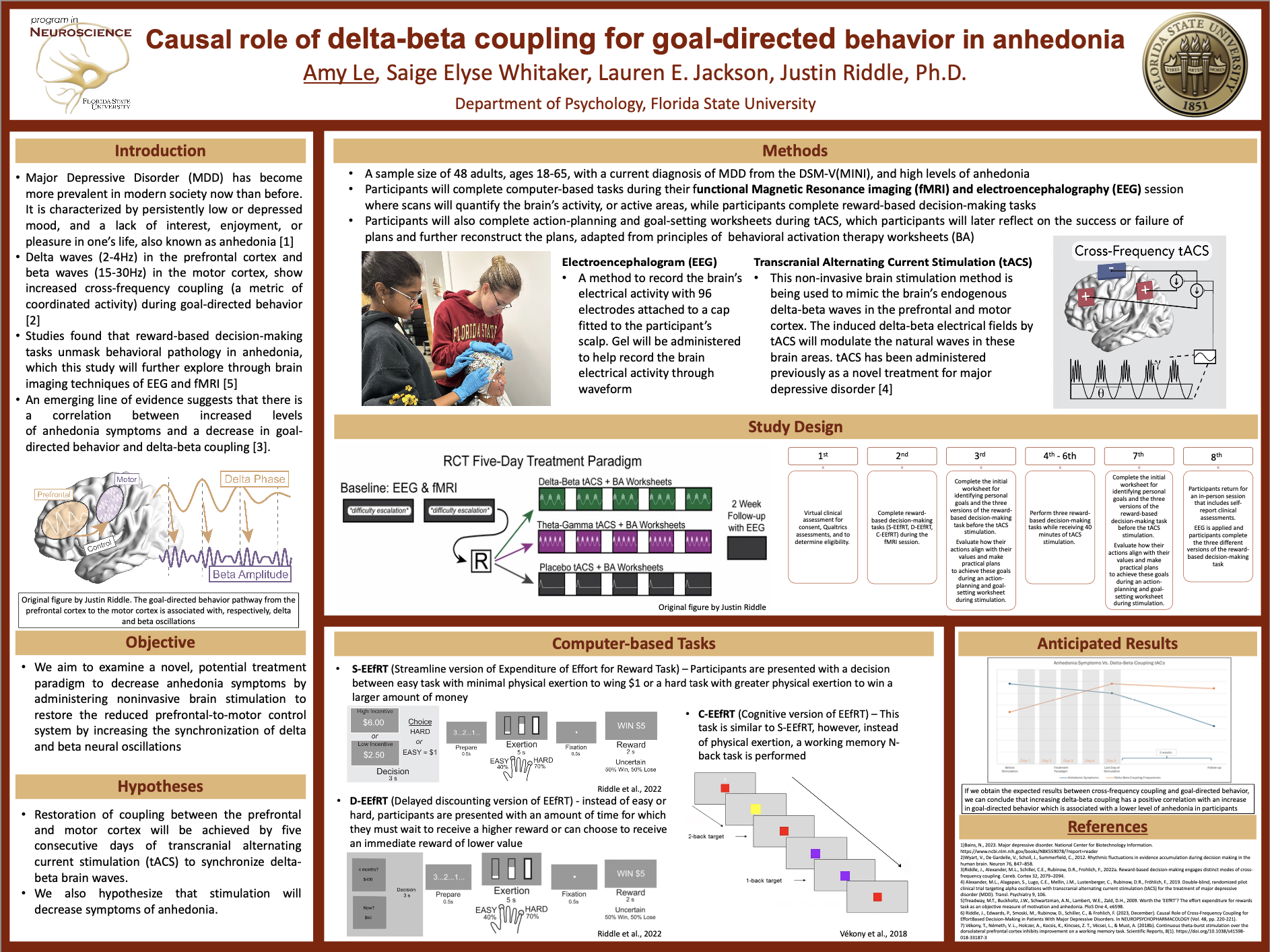Research Symposium
24th annual Undergraduate Research Symposium, April 3, 2024
Amy Le Poster Session 3: 1:30 pm - 2:30 pm /457

BIO
I am a third-year student majoring in Behavioral Neuroscience, with minors in Chemistry and Business. I grew up in Southern California for most of my life, but have since moved to Sarasota, Florida with my family a few years ago. Currently, I am a part of Dr. Riddle's cognitive neuroscience lab, where we explore many aspects of the underlying neural oscillation mechanisms in brain areas and how they modulate cognitive control, in hopes of developing a novel intervention for psychiatric illness. The project I am primarily focusing on investigates the neural circuit dynamics in the prefrontal and motor cortex and how that correlates with symptoms of anhedonia in depression by looking at motivational characteristics with reward-based decision-making tasks. In addition to this research, I have assisted in Dr. Wilber's spatial reorientation studies with rodent models of Alzheimer's Disease starting in my freshman year. With a strong interest in the behavioral and neurophysiological aspects of this field, I hope to one day practice medicine as a pediatric neurologist, where I have the opportunity to support and work alongside children with neurological disorders, while researching the prevalence and treatment of mental illness in adolescence, especially in the first-generation immigrant, low-income demographics.
Causal role of delta-beta coupling for goal-directed behavior in anhedonic depression
Authors: Amy Le, Justin Riddle, Ph.D.Student Major: Behavioral Neuroscience
Mentor: Justin Riddle, Ph.D.
Mentor's Department: Department of Psychology Mentor's College: FSU College of Arts and Sciences Co-Presenters:
Abstract
Rates of depression are increasing at an alarming rate in modern society. Anhedonia is a core symptom of depression, which is defined by a lack of interest, enjoyment, or pleasure in one’s life. In standard practice, depression is treated with first-line antidepressant medications. However, antidepressants are aimed at treating decreased mood and often do not change symptoms of anhedonia and can even worsen symptoms of anhedonia in some cases. In this study, we aim to examine a novel, potential treatment paradigm for anhedonia symptoms by administering noninvasive brain stimulation to restore reduced prefrontal control over the motor system, a critical mechanism for goal-directed behavior. In previous studies, participants with major depressive disorder and elevated anhedonia showed a deficit in goal-directed behavior and a decrease in delta-beta coupling, an electrical activity signature of prefrontal-to-motor control. Our experiment investigates the efficacy of a five-day treatment paradigm where participants receive transcranial alternating current stimulation (tACS) targeting delta-beta coupling while they complete goal-setting and action-planning worksheets. First, we use clinical assessments to ensure that participants are within a current episode of major depressive disorder. Then, participants complete functional magnetic resonance imaging (fMRI) and electroencephalogram (EEG) sessions while they perform reward-based decision-making tasks such as the Expenditure of effort for Reward task (EEfRT). These tasks engage goal-directed behavior to assess whether stimulation is able to increase prefrontal-to-motor delta-beta coupling. This study will build knowledge on the neural mechanisms underlying disrupted goal-directed behavior in anhedonia and potentially serve as a foundation for novel interventions in psychiatry.
Keywords: behavior, depression, anhedonia, electrical coupling, stimulation


